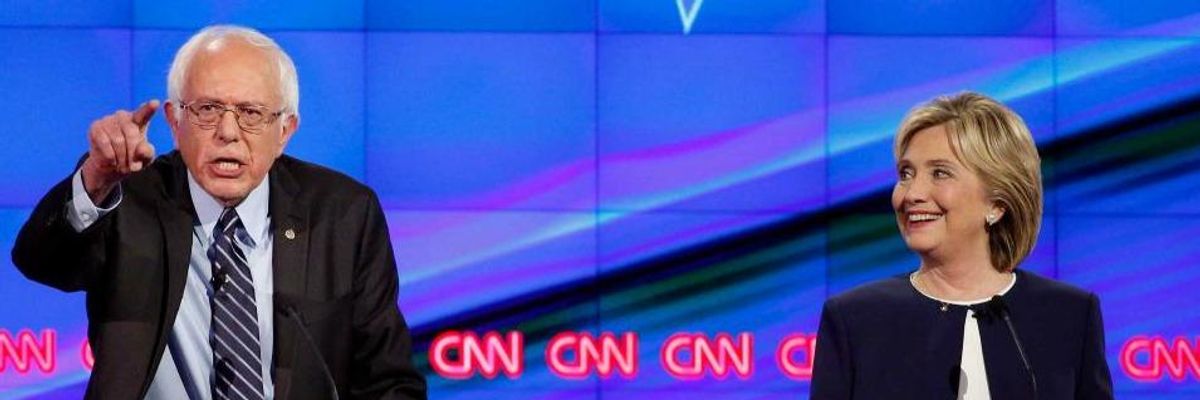The battle for the Democratic presidential nomination hit a new gear--though it may have ended for some--on Tuesday night as the party's five candidates seeking the nation's highest office squared off in their first televised debate from Las Vegas.
Brought to viewers by CNN and Facebook, the debate featured memorable back-and-forths on key issues as the two current frontrunners, Hillary Clinton and Bernie Sanders, discussed such issues as the role that "casino capitalism" has played in wrecking the middle class, the importance of fighting climate change, the scourge of gun violence that grips the country, the failures of U.S. foreign policy in recent years, pervasive racial disparities throughout the criminal justice system, and others.
Sanders was widely given credit for upholding his pledge not to go on the attack against his rivals and even went so far as to defend Clinton against the so far unshakeable questions related to her use of a private email server while she was Secretary of State. "Let me say something that may not be great politics," Sanders said. "But I think [Clinton] is right. And that is that the American people are sick and tired of hearing about your damn emails!"
In response, Clinton reached out and shook Sanders hand in thanks, but Sanders wasn't quite done. "And let me say something about the media as well. I go around this country and talk to a whole lot of people," he continued. "The middle class in this country is collapsing. We have 27 million people living in poverty. We have massive wealth and income inequality. Our trade policies have cost us millions of decent-paying jobs. The American people want to know whether we're going to have a democracy or an oligarchy as a result of Citizens United. Enough of the emails, let's talk about the real issues facing America."
The interchange resulted in some of the loudest applause for the evening.
According to The Nation's D.D. Guttenplan, "What was interesting about that moment was that, although they were all clapping together, the Sanders and Clinton supporters were clapping for different reasons. The Clinton people perceived, rightly, that by the terms of the typical gotcha score-keeping that we have gotten accustomed to, Sanders had just handed his opponent a great gift. What the Sanders people saw was their candidate showing, in the starkest possible terms, his disdain for that kind of politics."
Clinton, however, did not miss an opportunity--when presented with it--to go after Sanders on an issue perceived as a weakness when it comes to his progressive base of supporters: gun control. When asked by CNN's Anderson Cooper if the Senator from Vermont's position on guns was strong enough, Clinton didn't miss a beat and declared, "No. Not at all."
Though the more than two-hour-long debate covered a variety of vital issues issues, as well as a few trivial ones, what was most striking about seeing the Democratic candidates all one stage together, according to the Campaign for America's Dave Johnson, was the stark contrast of watching the Democratic candidates compared to recent Republican debates. As Johnson writes in an early-morning post on Wednesday:
The first Democratic debate showed the country what it is like to have adults on a stage. It doesn't matter who "won." The candidates showed they all are concerned about governing the country and proposing actual policies that will help actual people have better lives. And they showed that we have a serious and lively Democratic primary race in front of us. The country will be the winner.
In contrast to the entertaining Republican cage fight clown show racist, anti-government insult fest "debates", the first Democratic debate was almost entirely a serious debate on issues and policies, by serious people with serious policy proposals, who all did very well. It was a debate for people who actually care about governing the country and making regular people's lives better. It was a debate that would make Americans feel better about the future of their country.

